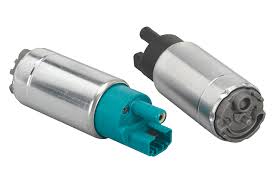The fuel pump can have a major impact on gas mileage. The pump is designed to provide fuel from the tank to the engine so that it runs at an adequate pressure and volume. If the pump starts to fail, because pressure output will not be consistent and as demanded by the engine it may deliver too much or two little fuel which is required for proper combustion. The engine will make up for the lack of fuel delivery (whether running too rich or lean) and may use as much as 15 percent more fuel to compensate.
Efficient fuel usage should be related to the performanced of the fuel pump in providing recommended level of pressure. A typical fuel pump will deliver 40–70 PSI depending on the engine type, and for most cars it will be sufficient. The fuel pump drops the psi required for the correct mixture to be fired by injectors if it loses this pressure, so engine will have more petrol burnt than needed. It can be very obvious in a vehicle fitted with a high-performance engine, where accurate fuel delivery is essential to keep both power and efficiency.
The constant will be the fuel pump, which can and sometimes does experience issues with clogged or dirty filters. When the engine has to work harder, it causes its efficiency percentage decrease so whenever that too starts happening there is a larger draw on power by fuel pump. Worst-case scenario, the fuel flow can be cut by as much as 25 percent, which will no doubt result in a significant drop in miles per gallon (MPG). Having a fuel filter replaced will usually set you back anywhere from $50 and $150; however, this small amount can recover up to 10% of lost gas mileage.
Problems with the fuel pump can also result in intermittent fuel delivery which can cause your engine to misfire or stall. In a case study of fleet vehicles even using the one eye fuel plug test to pinpoint suspected failing truck intank pumps as an issue, trucks reported up to 20% worse consumption from ineffective delivery and inflating operating costs. Replacing failing fuel pumps on time can prevent these inefficiencies and keep performance at its best.

Fuel injectors (which closely relate with the fuel pump) have large impact on gas mileage. Should the fuel pump fail to maintain correct pressure, issue may not be properly atomized by the injectors resulting in incomplete combustion. This may cause unburned fuel to come out the exhaust pipe, which is wasteful of gas and reduces efficiency. Regular fuel pump and injector tests allow automotive technicians to determine whether or not the correct amount of fuel is being delivered at proper pressure, this can actually increase an engines lifespan by approximately 5-10%.
Henry Ford once famously quoted saying, “You can't build a reputation on what you are going to do.” This should serve as a reminder to drivers that keeping up with maintenance on the fuel pump and its related parts is vital to getting good gas mileage. In addition to simply lasting longer, the best Fuel Pump also helps drivers squeeze every mile out of a gallon. Regular maintenance is one way GasBuddy experts say can deliver better economy from behind-the-wheel.